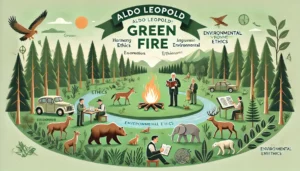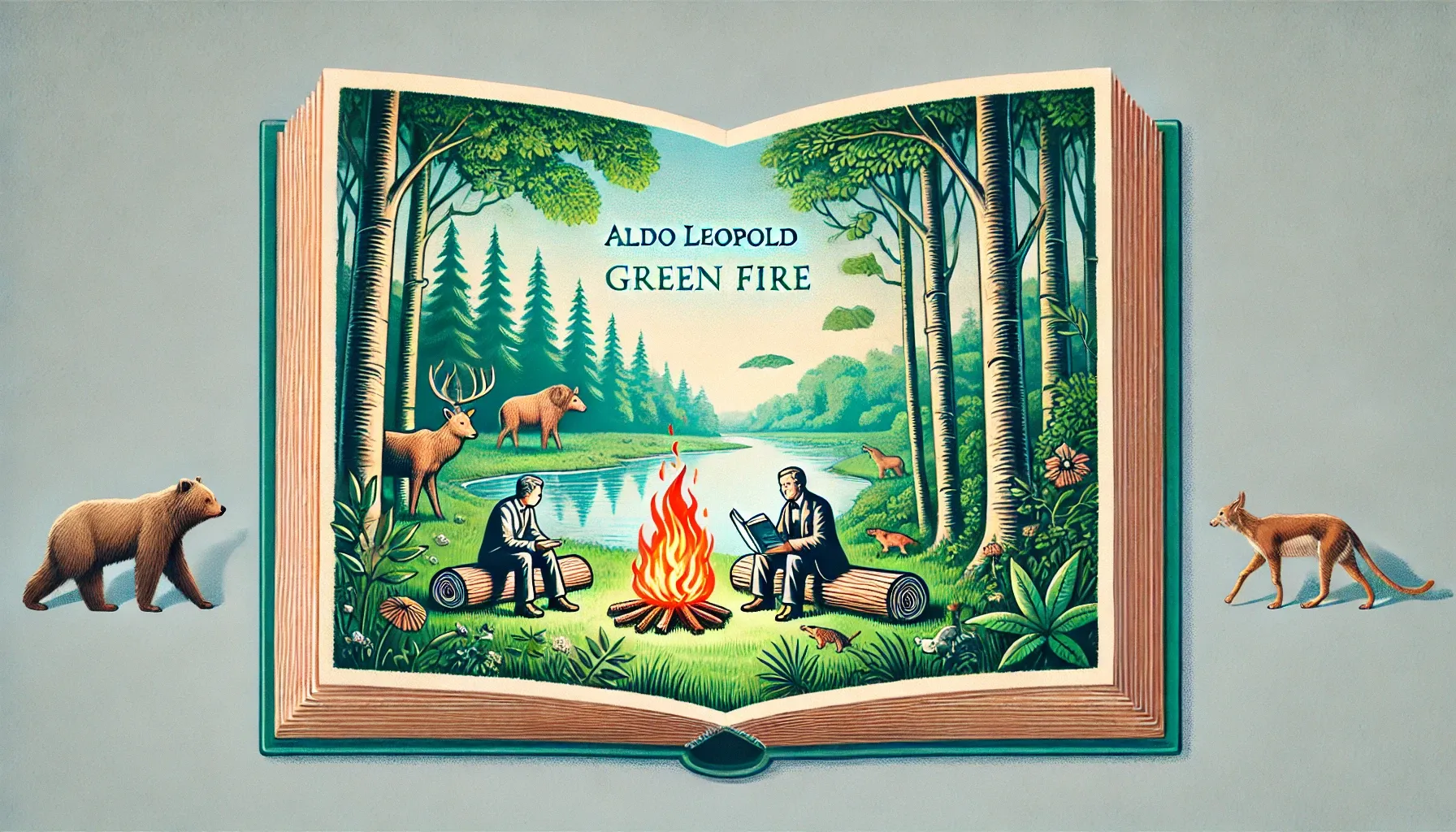Introduction
Aldo Leopold, widely regarded as one of the founding figures of environmental ethics, helped lay down significant new tracks with his reflections and writings. His best-known work, “A Sand County Almanac,” and in particular the essay called “The Land Ethic,” has been arguably more than any other single piece of writing an inspiration to those working for environmental stewardship. One of the most captivating parts of his life story is called “Green Fire,” a term he coined as an epiphany involving interconnectedness and how all living things are woven intricately into each other. Combine this with the spirited exchange here on CN between a cohort of alternative planning theorists and advocates over conceptual foundations, economic strategies, organizational forms, and political tactics. For example, is Strong Towns really post-doctoral planning?
Background: The Birth of Leopold’s Environmental Ethic

Early Life and Influences
Aldo Leopold (born in 1887 and raised near Burlington, Iowa) spent much of his childhood outside and deeply connected to the natural world from an early age. This first brush with nature laid the foundation for a lifelong dedication to conservation. Leopold spent the early part of his academic career studying forestry and ecological science at Yale Forest School.
Professional Career
Leopold started with the U.S. Forest Service, working in the Southwestern United States. His field experience managing forests and game showed him how tricky it could be for humans to interact with nature, which persuaded him to take a more comprehensive view of conservation. Poems by his hand, formed through the Dust Bowl period and also demonstrating the final results of poor land management, further illustrated this sentence, as the solution in acreage-use ensured.
The Transformative Moment
The phrase “Green Fire” comes from Leopold. In his essay “Thinking Like a Mountain,” he explains how one day, after killing a wolf and looking into its eyes, he saw green fire. This instilled in Leopold a deep intuition about the interdependence of life and the collateral damage from human interventions. He discovered that predators were essential to retain a healthy ecosystem—an idea counter to the wildlife management beliefs of those days.
Philosophical Foundations
Leopold’s idea of “Green Fire” is part and parcel of his larger land ethic concept. The land ethic simply enlarges the boundaries of the community to include soils, waters, plants, and animals, or collectively: The Land. It drives at the idea that humans are part of nature and need to start thinking of themselves as just another member or citizen rather than an invincible conqueror. It is an ethic based on ecology, on the understanding that all our individual actions are interconnected and interdependent.
The Land Ethic: A Conservation with No Management By Aldo Leopold (1948)
Ethical and Moral Dimensions
Leopold describes a land ethic that demands respect and caring for the land as if our lives depend on it. It defies the anthropocentric notion of nature as a tool meant for human use and asserts an ecocentric worldview, in which life is seen to have value only by virtue of its existence. Leopold says it is a right action if an act preserves the integrity, stability, and beauty of the biotic community; otherwise wrong.
Environmental Science & Conservation
The scientist in Leopold sourced these ethical views back to his background in ecology. He knew that ecosystems work like large puzzle pieces, feeding off one another, and human interactions typically lead to adverse impacts. A strong proponent of ecological health and resilience, his writings warn of tipping points with relationships to biodiversity conservation or ecosystem service delivery (Ehrlich & Daily 2001; Hobbs et al.).
Effects of “Green Fire” on Environmental Ethics
Impact on Conservation Practices
Leopold’s thinking has left an indelible imprint on conservation. This perspective identified the importance of predators in ecosystems and had long-ranging impacts on wildlife management worldwide. The notion of the land ethic has also played a key role in helping to formulate public stewardship policies based on ecological responsibility and long-term sustainability, informing areas from national park management to agricultural production.
Education and Advocacy
Leopold’s environmental education and advocacy legacy is profound. His works are widely used in environmental studies curricula, and his land ethic has been influential for conservationist movements. Organizations like the Aldo Leopold Foundation promote his vision through educational programs and resources to foster ethical land stewardship.
A Few Offerings in Environmental Philosophy
Leopold’s soil ethic is one of the foundational texts in environmental philosophy. The book has stimulated substantial debate and discussion that still influences much theorizing in the field, ranging from deep ecology to ecofeminism. Leopold inspired the work of subsequent scholars and activists who have extended discussions about the ethics of human interactions with nature while also advocating for more ecologically sustainable and socially just environmental practices.
Modern Implications: Modern Environmental Challenges
Global Warming and Biodiversity Decline
The environmental issues of today—climate change, biodiversity loss, and more—make Leopold’s land ethic a fundamental guideline. His perspective on the importance of ecological health and resilience can benefit all efforts to confront our global crises. We can now see the levels of interconnectedness he described, in that life is so integrated and embedded within endless webs, etc., the climate system(s) all pulling on each other without a moment’s rest.
Land Use and Agriculture
Leopold’s ideas also helped shape contemporary discussions of sustainable land use and agriculture. He focused his advocacy on techniques that conserve soil health, water quality, and biodiversity in line with contemporary sustainable agriculture principles. Integrated farming, agroforestry, and other best practices have their genesis in the philosophical stone of land ethics penned by Leopold.
Environmental Justice
The ethical aspects of Leopold’s labors are bound up with current issues around environmental justice. One could read this as his acknowledgment of a moral obligation to care for the land, which would broaden scrutiny beyond any simple charge of environmental elitism. It is part of the egalitarian idea that all people deserve clean air, water, and parks.
Challenges and Critiques
The Middle Ground Between Anthropocentrism and Ecocentrism
Leopold’s land ethic has been lauded but also criticized. Critics say that his focus on ecological integrity can at times overlook the human needs and rights of communities, especially those who are marginalized. An ongoing challenge exists in balancing the ecocentric focus of the land ethic with issues concerning social justice.
Practical Implementation
The application of Leopold’s ethical principles in conservation work can be somewhat complicated. Land management decisions are susceptible to economic pressures, political interests, and cultural values. Creating rules that adhere to the land ethic robustly can be a Sisyphean battle of continuous innovation.
Conclusion
Aldo Leopold’s “Green Fire” (or the larger land ethic) marked a turning point in environmental thinking. Leopold was a pragmatist but understood that if we truly expect to build within our environment as well as outside of it—whether housing and highways or forests and fields—then the ecological elements in all ecosystems need nurturing. Meanwhile, he also articulated an interconnectedness among living organisms, assuring readers that everyone had individual intrinsic value with no hierarchy above them. His work remains relevant in modern conservation concepts and environmental education, as well as philosophical discourse. In the midst of these challenging environmental issues, Leopold’s vision for a land ethic is as timely and thought-provoking today as it has ever been. This long-lasting effect of ‘Green Fire’ on environmental ethics demonstrates the continued power in Leopold’s work, grounded in ethical philosophies regarding our natural world.
